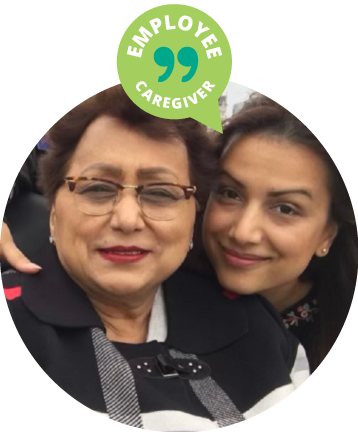Sanah Jowhari,
caring for her mother
I have been a caregiver for 24 years. My mom was already a single parent when she became paraplegic from a surgical mishap in India. Prior to her surgery, she was a successful woman – an IT educator, who loved gardening, cooking and caring for my grandparents, while raising me and my younger brother. This unexpected incident set us on a path of uncertainties. I was now in the driver’s seat with multiple roles, trying to get through university, keeping mostly to myself, and being at home as much as possible to support my mom, as we had no community supports available to us.
When we moved to Canada, I knew it was a better system but didn’t quite understand the extent of support available — it was like night and day. The idea that health care was completely free and that many of my mom’s ailments could be treated was a game changer. She was given a motorized wheelchair, which meant she could be more independent and do simple things herself like go to the mall. As a result, her mental health and well-being improved significantly.
As my mom grew more independent in some ways, my grandparents grew older and I became responsible for caring for them. With the COVID-19 pandemic came government service cuts, and my parents stopped receiving the care that they needed. I became their caregiver 24/7, which took a toll not just on my health but also on my career. I was unable to fulfill the demands at work, and despite knowing my situation my employer at the time didn’t invite an opportunity for a conversation either, so I had to move on.
Reflecting on my life’s circumstances, I was motivated to choose the path of entrepreneurship. I drew upon my years of experience within the technology sector and co-founded Pantala Technologies, a robotics solutions business that is now enabling innovative communication and respite options for caregivers. Balancing caregiving and business can be very challenging but having that sense of reliability that I can be there for my family as and when needed is amazing!
I strongly believe that employers can actively help employees who are caregivers, whether it is through job modifications, mental health supports or even reimbursement of costs to their physical health. As caregivers we don’t receive publicly funded support under the current patient-centered model of care. But we still need support! The solution to this problem is complex and multi-faceted, which will require organizations and caregivers to work together in order to bring about meaningful change.

“Balancing caregiving and business can be very challenging but having that sense of reliability that I can be there for my family as and when needed is amazing!”

“Balancing caregiving and business can be very challenging but having that sense of reliability that I can be there for my family as and when needed is amazing!”
Sanah Jowhari,
caring for her mother
I have been a caregiver for 24 years. My mom was already a single parent when she became paraplegic from a surgical mishap in India. Prior to her surgery, she was a successful woman – an IT educator, who loved gardening, cooking and caring for my grandparents, while raising me and my younger brother. This unexpected incident set us on a path of uncertainties. I was now in the driver’s seat with multiple roles, trying to get through university, keeping mostly to myself, and being at home as much as possible to support my mom, as we had no community supports available to us.
When we moved to Canada, I knew it was a better system but didn’t quite understand the extent of support available — it was like night and day. The idea that health care was completely free and that many of my mom’s ailments could be treated was a game changer. She was given a motorized wheelchair, which meant she could be more independent and do simple things herself like go to the mall. As a result, her mental health and well-being improved significantly.
As my mom grew more independent in some ways, my grandparents grew older and I became responsible for caring for them. With the COVID-19 pandemic came government service cuts, and my parents stopped receiving the care that they needed. I became their caregiver 24/7, which took a toll not just on my health but also on my career. I was unable to fulfill the demands at work, and despite knowing my situation my employer at the time didn’t invite an opportunity for a conversation either, so I had to move on.
Reflecting on my life’s circumstances, I was motivated to choose the path of entrepreneurship. I drew upon my years of experience within the technology sector and co-founded Pantala Technologies, a robotics solutions business that is now enabling innovative communication and respite options for caregivers. Balancing caregiving and business can be very challenging but having that sense of reliability that I can be there for my family as and when needed is amazing!
I strongly believe that employers can actively help employees who are caregivers, whether it is through job modifications, mental health supports or even reimbursement of costs to their physical health. As caregivers we don’t receive publicly funded support under the current patient-centered model of care. But we still need support! The solution to this problem is complex and multi-faceted, which will require organizations and caregivers to work together in order to bring about meaningful change.

